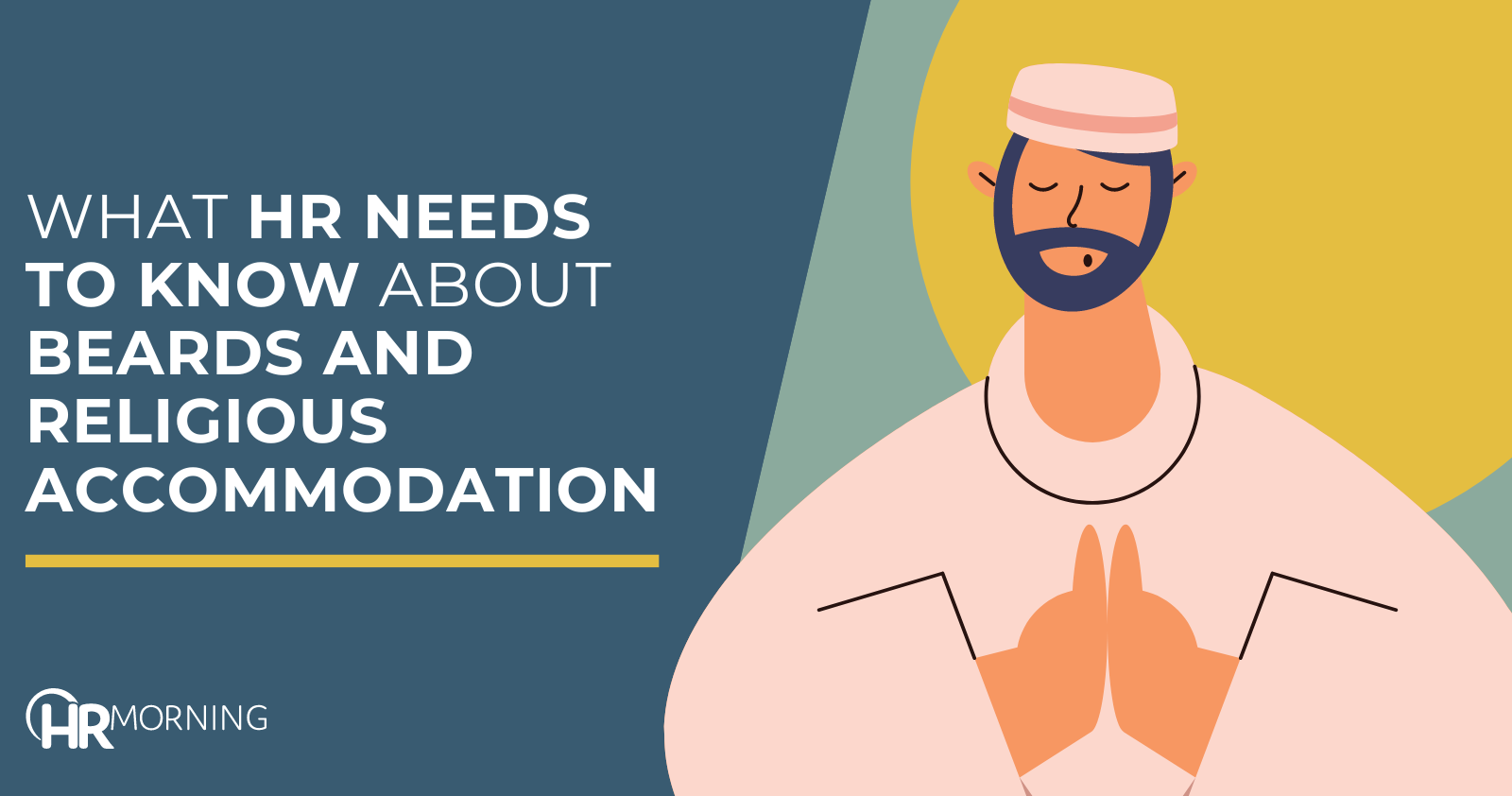Word to the wise: The Equal Opportunity Employment Commission (EEOC) is cracking down on religious discrimination based on facial hair, as these two recent settlements out of Illinois and Virginia show.
Here’s where the two companies went wrong in assessing employees’ beard accommodation requests.
Hobson’s choice: Shave or get fired!
The first case involved Blackwell Security Services, Inc., a security company in Illinois, and a Muslim employee who worked as a concierge.
According to the EEOC’s lawsuit, the employee is a practicing Muslim who wears a beard as required by his religious beliefs.
Shortly after the employee was hired, he was told by his supervisor that company policy requires all employees to be clean-shaven.
When the employee sought a religious accommodation, he was allegedly told to shave his beard or be terminated. To avoid losing his job, the employee complied. He said shaving his beard caused him “significant distress,” and he has since left the company.
In the EEOC’s view, the company’s alleged conduct violated Title VII of the Civil Rights Act of 1964, which prohibits religious discrimination and requires employers to provide reasonable accommodations absent undue hardship.
“Title VII protects Americans of all religious faiths and backgrounds and requires employers to make reasonable accommodations for employees’ religious practices when doing so does not impose an undue hardship on the employer’s business,” said Gregory Gochanour, regional attorney for the EEOC’s Chicago District Office. “Here, the accommodation the employee requested—being able to wear a beard at work in observance of his faith—imposed no burden on anyone. There was no need for this employee to be forced to choose between his religion and his livelihood. Employers must ensure that they evaluate accommodation requests in a manner consistent with federal law.”
To settle the lawsuit, the company agreed to pay $70,000 to the now-former employee. Under the consent decree, it will also:
- provide training to relevant management employees on federal laws prohibiting religious discrimination, and
- report any additional religious discrimination complaints to the EEOC for the decree’s duration.
Info: Blackwell Security Services Will Pay $70,000 to Settle EEOC Religious Discrimination Lawsuit, 1/31/24.
Prove it: Give us documentation from your religious leader
The other case is out of Virginia, involving Triple Canopy, Inc., a company that provides protective services to federal agencies, and a former employee who wore a beard.
According to a lawsuit filed by the EEOC, the employee held a Christian belief that men must wear beards even though he didn’t belong to a formal religious denomination.
Triple Canopy required employees to be clean-shaven and refused the worker’s requests for religious accommodation because he was unable to provide “additional substantiation of his beliefs or a supporting statement from a certified or documented religious leader,” the suit asserted.
The company allegedly made work conditions intolerable and removed him from the schedule after he complained to the EEOC. (Here’s a better way to respond if an employee files a complaint with the EEOC.)
In the EEOC’s view, the alleged conduct violated Title VII, which requires employers to accommodate sincerely held religious beliefs absent undue hardship and prohibits retaliation against those who complain about discrimination.
Mindy E. Weinstein, director of the EEOC’s Washington Field Office, said, “Religion under Title VII is broadly defined; it applies not only to mainstream religious beliefs that are part of a formal religious group, but also to all aspects of an individual’s religious observance, practice, and belief. When religion conflicts with a work requirement, employers must provide an accommodation, unless doing so would cause an undue hardship.”
Under a three-year consent decree resolving the lawsuit, Triple Canopy has agreed to:
- Pay $110,759 to the former employee
- Adopt and disseminate a new religious accommodation policy
- Provide training on religious discrimination and retaliation, and
- Submit quarterly reports to the EEOC on any claims of religious discrimination or retaliation.
Info: Triple Canopy, Inc. to Pay $110,759 to Settle EEOC Religious Discrimination and Retaliation Lawsuit, 12/26/23.
Help for HR: Assessing beard accommodation requests
It’s important for HR pros to understand that beards can hold deep religious significance for employees of various faiths. Here are key points to consider when assessing religious accommodation requests regarding facial hair:
- The cost of noncompliance. As you know, Title VII broadly protects employees from religious discrimination, and these two recent EEOC cases show that failing to comply with the law can be very expensive.
- Open the lines of communication. Provide clear procedures to submit religious accommodation requests, and encourage employees to discuss their religious needs openly.
- Conduct individualized assessments. Evaluate each request on a case-by-case basis, considering potential safety hazards and impact on job performance. Remember that “undue hardship” is a higher hurdle to clear since the Supreme Court’s Groff v. DeJoy ruling last year.
- Prioritize respect. Foster an inclusive work environment where diverse religious expressions are valued and accepted.


